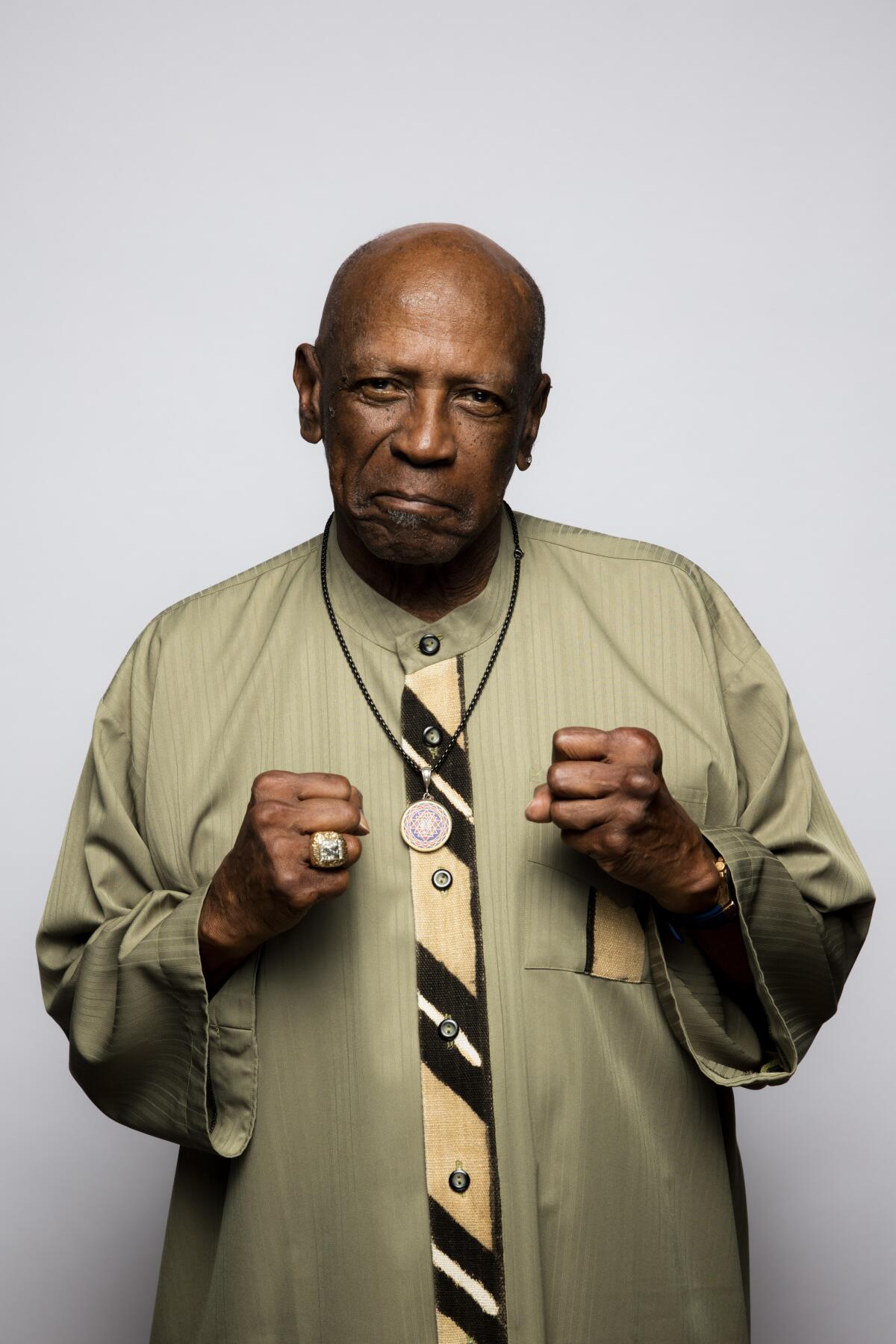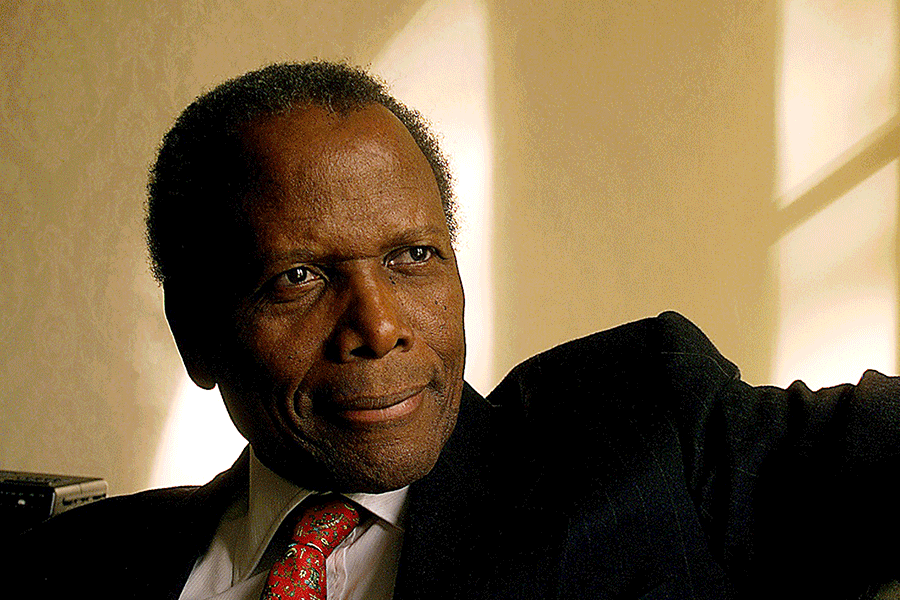Louis Gossett Jr., ‘An Officer and a Gentleman’ star who broke barriers in Hollywood, dies

- Share via
Lou Gossett Jr. was still a teen, fresh off a successful Broadway run, when he landed at LAX and headed to Beverly Hills in a cherry red Ford Fairlane, feeling on top of the world.
He didn’t get far before the cops pulled him over, saying he matched a description of someone they were looking for. A few miles later, it happened again. And then again. By the time he got to the Beverly Hills Hotel, a squad car had rolled up and the officers handcuffed Gossett to a tree as they tried to figure out what a young Black man was doing in town.
“Welcome to Hollywood,” the Oscar-winning actor wrote years later in his memoir, “An Actor and a Gentleman,” recounting his inaugural trip to L.A. in 1967. “Welcome to reality.”
For Gossett, it was just another painful reminder that as a Black actor, no matter the awards, no matter the acclaim, the barriers would always be high, the odds always long.
“I had to act as if I was second class. I had to behave myself,” he told The Times in 2008. “The only time I was really free was when the director said ‘action’ in front of a camera or on the stage and that’s when I flew.”
Forever remembered for his career-defining roles in “An Officer and a Gentleman” and the influential television miniseries “Roots,” Gossett died Thursday night in Santa Monica, his nephew told the Associated Press. No cause of death was revealed. He was 87.
Much like Jesse Jackson or Andrew Young’s lifelong devotion to the civil rights movement, Gossett had been present for many of the iconic moments of Black theater, film and television over the last half-century.
He appeared with Sidney Poitier in “A Raisin in the Sun” in 1961, when racial stereotyping in the movies was still the norm. He won an Emmy as a slave named Fiddler in “Roots” in 1977 as ABC fretted whether the series should even be shown in the Deep South. And when an Academy Award for his role as the steely, no-nonsense drill sergeant in “An Officer and a Gentleman” failed to turn on the spigot for more meaningful roles, Gossett masked his anger with drugs and alcohol and then rescued himself with activism.

Louis Cameron Gossett Jr. was born May 27, 1936, and raised in Sheepshead Bay, N.Y., not far from Coney Island. His mother, Hellen, was a nurse and his father, Louis Sr., a porter. He aspired to be a basketball player but thought it might be best to study medicine, in part so his mother could proudly introduce him as “my son, the doctor.”
At 17, a high school English teacher pulled Gossett aside and told him there was a theater company looking for a young Black actor. With little to no acting experience, Gossett auditioned and won the role in “Take a Giant Step,” a coming-of-age story that opened on Broadway.
“I knew nothing about acting,” he told NPR in 2010. “I had never even seen a play.”
A point guard, Gossett tried out with the New York Knicks when he was a student at New York University but put basketball and school aside when acting roles kept rolling in. By the time he was 23, he was starring alongside Poitier in “A Raisin in the Sun,” first on Broadway and then on film. He also appeared opposite James Earl Jones and Cicely Tyson in “The Blacks,” an off-Broadway production with an all-Black cast that ran for 1,408 performances.
But by the late ’60s, he was living in L.A. and struggling to find work. He turned to songwriting and handed off one of his songs, “Handsome Johnny,” to musician Richie Havens, who recorded the antiwar song for his 1966 album, “Mixed Bag,” and later performed it at Woodstock. Gossett said the song ended up saving him from eviction, an $11,750 royalty check arriving just as movers were prepping to haul out his furniture.
“Roots,” the sweeping story of a Black family’s struggles from enslavement to post-Civil War life, changed careers and attitudes in Hollywood with its success and powerful storyline. For Gossett, however, it felt all too familiar.
“I was raised an only child but I was also raised with 25 or 30 cousins,” he told The Times in 1996. “My grandparents and aunts would take care of all the kids when our parents were working, and in the summertime, we’d all ship south to the farms in South Carolina or Georgia.”
Sidney Poitier, who made history as the first Black man to win an Oscar for lead actor and who starred in ‘Guess Who’s Coming to Dinner,’ has died.
Gossett knew as soon as he saw the script that playing military taskmaster Emil Foley in 1982’s “An Officer and a Gentleman” was a special opportunity. While Richard Gere, Debra Winger and the other stars stayed in Port Townsend on Washington’s Olympic Peninsula, Gossett bunked with a company of Marines miles from the set.
“They put the steel in my butt, so that when I’d walk on the set and shout, ‘Get down and give me 50’ to the cast, by God, they’d do it.”
The performance earned Gossett a supporting actor Oscar, making him the first Black actor to win that category. Hattie McDaniel was the first Black actor to win an Oscar when she received the supporting actress award in 1940 for her role in “Gone With the Wind.” Poitier was the first Black performer to win the Oscar for lead actor for his role in “Lilies of the Field” in 1964.
Gossett thought the award would cement him as a go-to lead actor just as it had for his idol, Poitier. He asked his agent to seek out opportunities to play district attorneys, physicians, police chiefs and family-involved fathers. “Anything but those stereotypes reserved for Black actors,” he said during an interview with the Television Academy Foundation.
He seethed when plum roles failed to arrive and was forced to follow “An Officer and a Gentleman” with a role in “Jaws 3-D,” a second sequel to Steven Spielberg’s blockbuster.
He turned to cocaine and alcohol to numb his disappointment and watched his marriage crumble. After undergoing treatment for drug and alcohol abuse, Gossett threw himself into working with inner-city charities and formed his own, Eracism Foundation, an L.A.-based nonprofit devoted to “the removal from existence of the belief that one race, one culture, one people is superior to another.”
Tyson spent more than 60 years using her platform not only to garner awards but to challenge stereotypes about what it means to be a Black woman in America.
Never out of work for long, he appeared in “Enemy Mine” with Dennis Quaid in 1985, “Iron Eagle” in 1986, “Toy Soldiers” in 1991, “Diggstown” in 1992, “A Good Man in Africa” in 1994 and “Left Behind: World at War” in 2005, among many. Even at 80, he had six films in the works. In all, he appeared in more than 200 films and TV shows, most recently in last year’s version of “The Color Purple.”
Gossett regretted that, in the long history of cinema, more films were not made about the roots of African Americans.
“Everybody knows about the Romans and the Greeks and the Vikings and the British,” he told the Washington Post in 2016. “But there’s another culture that’s very rich: the African culture.”
If such a film opportunity existed, he said he’d jump at the chance to portray Hannibal, the Carthaginian general who crossed the Alps with a pack of soldiers and elephants to sack Rome during the Second Punic War.
“We have to tell those stories. Our inclusion in history is important to see, especially for African American children,” he said. “They have to know whose shoulders they stand on.”
Married and divorced three times, he is survived by two sons, Satie and Sharron.
The Associated Press contributed to this report.
More to Read
Only good movies
Get the Indie Focus newsletter, Mark Olsen's weekly guide to the world of cinema.
You may occasionally receive promotional content from the Los Angeles Times.












